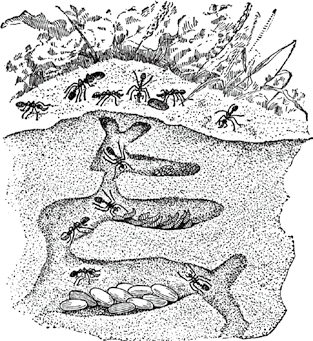




1. How often you have seen ants running about the lawn, but have you ever stopped to watch them and to study their habits? Let me tell you some facts which have been learned about them. I am sure they will give you a new interest in these wise little creatures.
2. It may seem to you that ants run to and fro in an aimless way; but this is not the case, for they have work to do, and they are doing it with all their might. They cannot see far before them, and it is by means of their feelers, or perhaps by scent, that they find their way
3. You must remember that small weeds are to them like huge trees, so we must look upon them as travelers following a track through great forests. You will see, too, that ants stop from time to time to rest and to clean off the particles of earth which cling to them.
4. Ants, like bees, do not enjoy living alone. In their homes, which we call ant-hills, many thousands of them live together. These homes are like great cities; indeed, such places as London and New York are the only human cities which compare with them in size. There is never any disorder in these great homes, although each ant is free to build, fight, hunt, orgo where it pleases.
5. If the top of an ant-hill be taken off, there will be found nurseries, chambers, halls, and kitchens—all snug and waterproof.
6. In some countries ants build their houses above ground and tunnel out great cellars under them. But most of the ants we know make their homes in the earth, where they can keep warmer than in nests above ground.
7. Some ants tunnel out a home in the ground and make a littlehillock
 of earth around the top. At night they close the entrances with leaves, bits of straw, and tiny twigs. If you watch their nests in the morning you see the busy little ants open their doors and hurry out.
of earth around the top. At night they close the entrances with leaves, bits of straw, and tiny twigs. If you watch their nests in the morning you see the busy little ants open their doors and hurry out.
An ant and its cow
8. Some hunt insects for food; some gather honey from flowers; others milk their

An ant’s nest
cows. These cows are plant lice, which yield a sweet juice of which ants are very fond. So ants keep herds of these little insects. They keep also beetles and other insects as pets, or for use.
9. While some of the ants are getting food, those at home are busy clearing out the galleries and doing other work. The well-fed ants return to the nests and share their food with the workers. One of the ant laws is that each must help others for the good of all.
10. Deep down in the bottom of the nest lives the queen ant, the mother of the family, who is very much larger than the others. She does not take care of her little ones. This is done by ant nurses, who pick up the tiny eggs and care for them. In the morning the eggs are carried up to the higher chambers, which are warmed by the sun. In the evening they are taken back to the lower rooms away from the chill air.
11. The eggs hatch into grubs, which look like little grains of rice. These are the ant-babies. The careful nurses feed them, keep them warm and clean, and carry them from one room to another, for babies, you know, must be kept comfortable. Think how busy the nurses must be with hundreds and thousands of babies to care for!
12. Some ants keep slaves. Regular bands of soldiers go out and bring home the grubs of another kind of ant. When these grow up they help their masters work. Sometimes the masters depend so much on their slaves that they will not build nests, care for their young, nor even feed themselves. They become so helpless that they die if their slaves are taken from them.
13. Sometimes two ants will fight together until both are killed. Sometimes armies of ants fight together fiercely until one or the other party comes off victor.
14.In cold countries ants sleep through the winter deep down in their lower rooms. In warmer countries they lay up stores in summer for the chilly days when it would be hard for them to find food in the meadows and field
15. In Texas there are ants which clear spaces ten or twelve feet around their nests, only leaving the needle grass or “ant rice,” which they use for food.
16. Among other interestingspecies
 of ants are the leafcutting ant, found in Central America, and the honey ant of Mexico.
of ants are the leafcutting ant, found in Central America, and the honey ant of Mexico.

Leaf-cutting ants
1.Write sentences telling five things you have learned about ants from this story.
2.Can you tell anything not mentioned above which you have learned in observing ants?